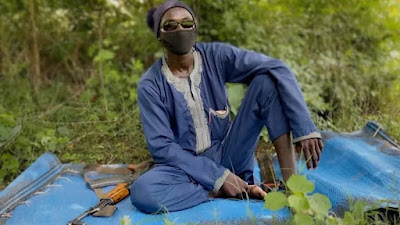Powerful, poignant and moving documentary.
It captures, almost perfectly, the overwhelming sense of pathos and anomie in a society driven to the point of total disintegration.
There is of course a background to this: the encroaching Sahara and its effect on nomadic cattle-rearers, the corruption of the state and the consequent entrenchment of poverty.
The tractor, the cow, the schoolbook and even the ethical & moral values that are the presumed proceeds of a people steeped in religious observance are all now firmly subservient to the rule of the gun.
For it is through the gun that the bandit perceives the ONLY means of enabling his making a living, while the vigilante believes it is the means of dispensing retributive justice or revenge. Meanwhile the ordinary bystander who is convinced that the state has forsaken him and cannot protect him can only conceive of his self-preservation as coming from the barrel of a gun.
This is a tragedy of remarkable immensity.
It is a tragedy that would have been avoided if Nigeria had a different calibre of political and social leadership. Leaders who through decades-long planning could have met the ecological challenges prevalent in the Sahelian region by developing protective forest belts, instituted a system of cattle ranching and sought to construct an ambitious waterway like the Great Man-Made River project undertaken and completed during the era of the Libyan leader, Colonel Muammar Gaddafi.
But in the documentary, we see the hapless politicians with their vainglorious ways putting the released girls through the excruciating ordeal of a pointless public meeting.
I thought that the film perfectly summed up the anger and frustration of the society at large when the young men were captured hurling oaths in front of the camera as they complained about their worthless leaders, as well as the incompetence and cruelty of the state after a boy had been fatally shot during the protest about lack of security.
The question for me as always with these conflicts in contemporary Africa is not about focusing on the rights and wrongs of the threatened secession of ethnic groups in countries such as Nigeria, Ethiopia or Cameroon. Nor is it about being conscripted into supporting or debunking a narrative which demonises the Tigrayan and the Fulani.
It is simply to seek out any rumblings, no matter how faint, of the emergence of a special calibre of thinkers and doers who can become the inspiring statesmen and the productive social architects of the future. Men and women who will seize the reins of power and proceed to move Africa away from its largely regressive state and put it onto the path of substantive political and economic development.
© Adeyinka Makinde (2022).
Adeyinka Makinde is a writer
based in London, England.

Yes, Yinka. I pray that comes soon. May the special calibre you speak of manifest sooner than later.
ReplyDelete